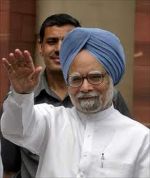 | « Back to article | Print this article |
 Terming as "grossly inadequate" the current judge to population ratio, Prime Minister Manmohan Singh assured chief ministers of more central funds for creation of infrastructure for subordinate judiciary to address the issue of pendency of over three crore cases.
Terming as "grossly inadequate" the current judge to population ratio, Prime Minister Manmohan Singh assured chief ministers of more central funds for creation of infrastructure for subordinate judiciary to address the issue of pendency of over three crore cases.
"The judge to population ratio at the current level of 15.5 judges per million is indeed grossly inadequate. We need to alter this equation so as to address the problems of pendency and delays in disposal of cases," he said.
Singh was speaking at a conference of chief ministers and chief justices presided over by Chief Justice of India Altamas Kabir.
The prime minister said he fully agreed with Kabir that there was a need to significantly enhance the number of judges and wanted the Chief Ministers to take initiative in this regard.
He noted that over three crore cases were pending in various courts across the country of which 26 per cent were more than five years old.
"On behalf of the Central government, I would like to assure this august gathering that we would increase appropriately the quantum of funding for the scheme under which we provide support to the State governments for creation of infrastructure for subordinate judiciary," Singh said.
He said the Centre would engage with the 14th Finance Commission for devolution of funds to the state governments specifically for the judicial sector and also request it to earmark funds for establishing fast-track courts for speedy trials not only in cases of heinous crimes but also in offences against the elderly, women and children.
In a note of caution, Singh said voice of sanity and logic should not be suborned to momentary impulses amid growing demand for judicial reforms.
"At a time when the demand for judicial reforms and change in the legal processes has acquired a new urgency, we must ensure that the voice of sanity and logic is not suborned to the momentary impulses of the day," the prime minister said.
"Fundamental and time tested principles of law and natural justice must not be compromised to satiate the shrill rhetoric that often defines our political discourse and sometimes succeeds in drowning appeals to logic and justice," Singh said.
Noting that the national outrage after the Delhi gang rape incident had compelled an urgent introspection about laws and justice delivery system, Singh said, "We must not allow ourselves to be overcome by a sense of despair at some of the demonstrated inadequacies of our legal system."
He said the government had moved with expedition to respond to the felt sensitivities of the people and brought about significant amendments in the criminal law to effectively deal with heinous offences against women.
"...A great deal more needs to be done as far as offences against women are concerned. I am happy that one of the issues on the agenda of your conference is sensitisation of the Judiciary on gender issues," Singh said.
The prime minister said the Centre, the state governments, and the high courts were working in close coordination for upgradation of the information and communication technology infrastructure in the Supreme Court, the high courts as well as provisioning for ICT in the 14,249 district and subordinate courts.
Singh said a National Judicial Data Grid will be an important outcome of this project and it will provide a unique platform for accessing judicial statistics on pendency on a real time basis across the country.
It will provide information to people on cases and will bring about an improvement in the working of courts through better case handling and case management, he said, adding that NJDG had the potential to transform the working of the lower judiciary.
"In an imperfect world, the ideal state of justice may seem distant. But, the test of a just arrangement lies in its ability to promote dignity and self-respect of all the citizens, strengthen the bonds of human solidarity and encourage the creativity of the individual," Singh said.
He said the government has set up the National Mission for Justice Delivery and Legal Reforms in the Department of Justice for pursuing the objective of reducing the pendency of cases in the courts.
He said that the CJI has established the National CourtManagement Systems which will develop a National Framework of Court Excellence.
"This framework will lay down timelines and measurable standards of performance for courts on the touchstone of quality," Singh said.
He said a Case Management System will also be developed to establish user friendliness of the judicial processes.